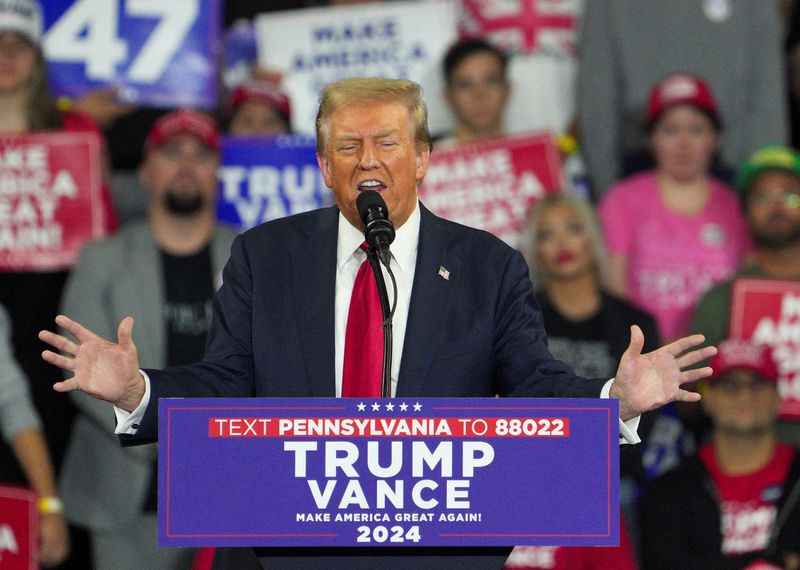By Moira Warburton
WASHINGTON (Reuters) – Republican presidential candidate Donald Trump and members of his party running for the U.S. Senate are blaming immigrants for the rising cost of housing, though a review of economic data and independent research suggests their effect is limited.
In making the argument, former President Trump and his allies are seizing on housing costs – a major economic concern of U.S. voters – as a reason to crack down on immigration, one of his core campaign issues.
Unaffordable housing was registered voters’ second-biggest concern about the U.S. economy in an August Reuters/Ipsos poll. One in three voters cited housing costs, second only to the 56% who cited worries about income lagging inflation.
Vice President Kamala Harris, Trump’s Democratic rival in the Nov. 5 election, has put housing at the center of her economic pitch to voters. She plans to spur new construction and reduce costs for renters and home buyers, largely through tax incentives.
Over the past decade the U.S. has built new homes and apartments at about a 30% slower annual pace than before the 2008 financial crisis, leaving the market 1.5 million units shy of what would be needed to balance supply and demand, according to Freddie Mac estimates. Other forecasters, notably Moody’s (NYSE:MCO) Analytics, put the shortfall closer to 2.9 million units.
That shortage plus COVID-fueled inflation have driven average rents up about 23% compared with 2020, estimates by Apartment List show. U.S. home prices have risen 50% in the last five years and rents have risen 35%, according to real estate firm Zillow (NASDAQ:ZG).
Immigration “is driving housing costs through the roof,” Trump told a rally in the battleground state of Arizona in late September, standing in front of a backdrop that read: “Make housing affordable again.”
Speaking in Tucson, Trump pointed to the number of immigrants who have entered the United States in recent years compared to the number of houses built, two statistics also used by Kari Lake, the Republican Senate candidate in that state, as proof of their argument.
“It’s just basic common sense,” Lake said in an interview. “These people have to live somewhere, and this is basic supply and demand.”
In Wisconsin, Republican U.S. Senate candidate Eric Hovde told a local news outlet that closing the border would ease economic pain points.
“We’re already having a hard time providing affordable housing and healthcare to our own citizens,” Hovde said. His campaign did not respond to a request for comment.
LIMITED LINK, ACADEMICS SAY
Academics who study the intersection of immigration and housing say migrant inflows have a small effect on prices, with a 1% increase in a city’s population typically pushing rents and housing prices up by a corresponding 1%.
Overall consumer prices have risen 21% since 2020, according to federal data. At the Massachusetts Institute of Technology’s Urban Economics Lab, Director Albert Saiz said his research indicates that rise has been the main driver of home prices and rents, followed by the rise in remote work leading to demand for larger homes with office space and more homes outside major coastal cities.
The effect of immigration trails those factors, he said.
“Quantitatively I don’t think it’s even close to explaining what’s happened,” Saiz said. “Clearly the other issues are more important.”
Madeline Zavodny, a professor of economics at the University of North Florida, co-authored a recent paper released by the Federal Reserve Bank of Dallas that listed immigration as one force driving up rents. She said workers who entered the country illegally could contribute to that.
But she also noted that because migrants, and specifically migrants who enter illegally, make up a large share of construction workers, they are likely “having a bigger impact on housing supply than on demand,” which works to bring down housing prices overall.
The Trump campaign did not immediately respond to a request for comment about economists’ findings.
The idea that immigrants are fueling a nationwide housing shortage comes from a false impression of the economy that there are a fixed number of houses, Julia Gelatt, of the nonpartisan Migration Policy Institute, said. “Immigrants fill housing units, but because immigrants work at high rates in construction and remodeling, they also help to increase the housing supply.”
That fact is likely understood in a border state like Arizona, where immigration has been a top issue for decades, said Barrett Marson, a Republican strategist based in the state.
“Most voters are smart enough to know that … immigrants who are day laborers are not moving into the home in my price range,” he said.
But in an election where cost of living is a major issue on voters’ minds, Marson said, “the fear-mongering doesn’t have to be true to be effective.”

